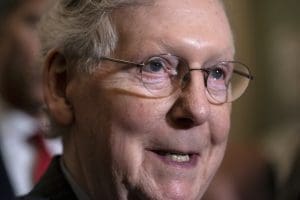McConnell says his refusal to act on virus relief for months was a good thing
The Democratic-controlled House of Representatives passed a coronavirus relief bill on May 15.

Senate Majority Leader Mitch McConnell said Wednesday that his decision to block disaster relief for months for Americans suffering due to the impacts of the coronavirus was a good thing. His reasoning: It gave the country time to see whether the COVID-19 pandemic would somehow just go away on its own.
“It allowed us to learn the coronavirus didn’t mysteriously disappear,” McConnell told the New York Times. “It is still here.”
He argued that his inaction since May has been “the reasonable thing to do” because “pushing the pause button meant seeing how what we have already done is working.”
The Democratic-controlled House of Representatives passed a coronavirus relief bill on May 15. If enacted, it would provide trillions of dollars in response to the economic and public health challenges of the pandemic.
McConnell vowed to block the legislation in the Republican-controlled Senate, mocking it as “not serious” and “dead on arrival.” He instead promised to consider taking action on a different response plan.
“We’re taking a careful look at a fourth and final bill,” McConnell said on May 29. “You could anticipate the decision being made on whether to go forward in about a month. And it will be narrowly crafted, designed to help us where we are a month from now, not where we were three months ago.”
House Speaker Nancy Pelosi criticized McConnell’s obstruct-and-see approach at the time, saying, “We need a pause? Tell that to the virus. Is the virus taking a pause? Is hunger in America taking a pause?”
In the months that have followed, the coronavirus has continued to spread across the nation, and millions more Americans have lost their jobs. A temporary federal program to provide an extra $600 in weekly unemployment insurance benefits for those millions expired last week.
Had the Senate passed the House bill in May, things might have been very different.
It contained $75 billion to enhance coronavirus tracing, testing, and treatment. It would have expanded hazard pay and child care for essential workers and created an emergency exposure control plan to protect them in the workplace. It would have extended the unemployment benefit until January.
Instead, McConnell focused on confirming Donald Trump’s nominees to judgeships and executive branch positions and sent senators home for recesses.
When he finally announced a Republican bill on July 27, it quickly became apparent that the bill was going nowhere. GOP senators panned provisions allocating billions of dollars to unrelated pet projects, and Trump dismissed it as “semi-irrelevant.”
Congressional Democrats and the Trump administration are now attempting to negotiate a relief deal, but have struggled to find common ground. White House chief of staff Mark Meadows warned Wednesday that if an agreement isn’t reached by Friday, it was unlikely to be done at all. “We’ve been spending so much time together that if you’re not making progress, there’s no sense to continue.”
McConnell has not been involved in the talks, but he says he is unconcerned.
“Every decision I make about this sort of thing is entirely calculated,” he told the Times on Wednesday. “It eliminates sitting there and having to listen to Pelosi and [Senate Minority Leader Chuck] Schumer’s talking points, which gets in the way of serious discussion.”
Published with permission of The American Independent Foundation.
Recommended

Biden calls for expanded child tax credit, taxes on wealthy in $7.2 trillion budget plan
President Joe Biden released his budget request for the upcoming fiscal year Monday, calling on Congress to stick to the spending agreement brokered last year and to revamp tax laws so that the “wealthy pay their fair share.”
By Jennifer Shutt, States Newsroom - March 11, 2024
December jobs report: Wages up, hiring steady as job market ends year strong
Friday’s jobs data showed a strong, resilient U.S. labor market with wages outpacing inflation — welcome news for Americans hoping to have more purchasing power in 2024.
By Casey Quinlan - January 05, 2024
Biden’s infrastructure law is boosting Nevada’s economy. Sam Brown opposed it.
The Nevada Republican U.S. Senate hopeful also spoke out against a rail project projected to create thousands of union jobs
By Jesse Valentine - November 15, 2023








































































